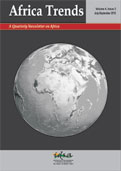EU-Libya Migrant Deal
Given the lack of feasibility of other policy initiatives in order to deal with Libya, from where majority of migrants cross-over, militarisation remains the only option. Even the military solution is going to achieve partial results and human trafficking will continue to thrive. In all the chaos, migrants will be caught between a rock and a hard place, with Libya being unpropitious to stay and journey to Europe being increasingly perilous.
- Published: July-September 2016










